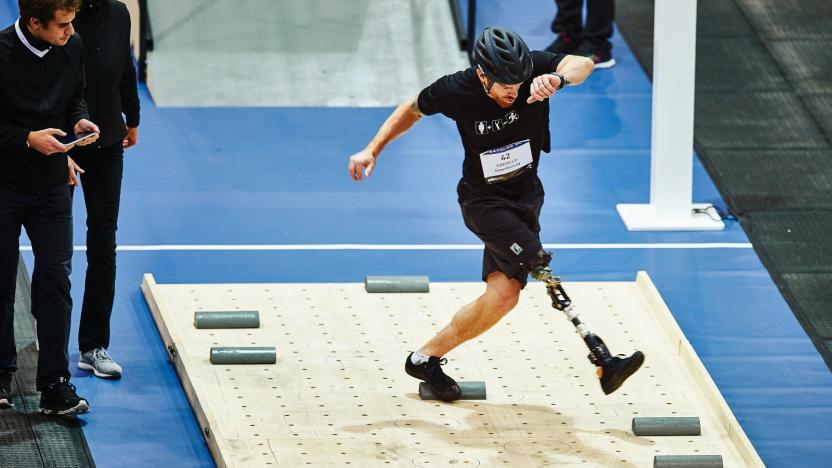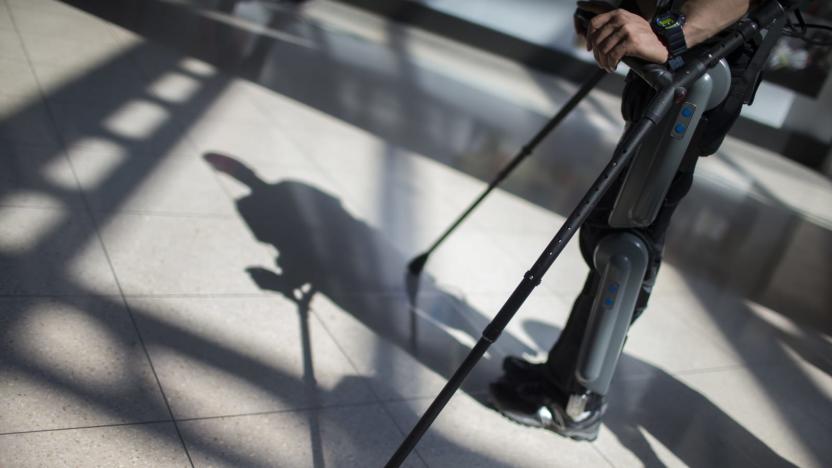cybathlon
Latest

The Cybathlon returns in 2020
The world's first Cybathlon, a single-day sporting competition designed for people with severe disabilities, was a massive success in 2016. We documented the games, tech and cheering crowds that filled Zürich's Swiss Arena in a five-part video series -- and in 2020, we'll have the chance to do it all again. The Cybathlon will officially return in May 2020 as a two-day event in Zürich.

The Engadget Podcast Ep 11: Everybody Hurts
Managing editor Dana Wollman and senior editor Mona Lalwani join host Terrence O'Brien to talk Macbook rumors, Amazon ISP ambitions and Julian Assange. Then they'll talk about all the work that went into Engadget's five part series covering the world's first cyborg games, Superhumans and look at VR's ability generate empathy.

The first Cybathlon pushed the limits of bionic technology
Andre van Rüschen slowly climbed a five-step ramp at the end of his race. With a black processor strapped to his back and leg supports on either side of his lower limbs, he stayed focused on the body-machine coordination that was keeping him upright. He had walked over a wooden slope, criss-crossed bright yellow bars and tried to step on gray discs that were placed irregularly on the floor. Now, standing atop the last obstacle in the exoskeleton race, he took a moment to pause and look up at his opponent on the adjacent track. They were both on the ramp, going head-to-head at the world's first Cybathlon, a sporting competition designed for people with severe disabilities. The crowd inside the Swiss Arena in Zürich cheered them on. Van Rüschen, the German pilot who was using a ReWalk exoskeleton, quickly regained his focus and prepared to walk down the next five steps to complete the race. He hit a button on the remote around his wrist to change the settings from "walk" to "climb" and quickly adjusted his upper body to balance his weight on the crutches in his hands. With his competitor, Mark Daniel, right on his heels, he leaned forward to pick up the pace.

Pushing the limits of exoskeleton technology at the Cybathlon
Andre van Rüschen has no memory of the day he lost all feeling in his legs. After a car accident in Germany, he had a spinal cord injury that left him paralyzed from the waist down. When he woke up from a coma in a hospital in Hamburg, the doctors told him he would never walk again. But now, thirteen years later, van Rüschen is back on his feet, and he is training to compete as a pilot in the Powered Exoskeleton race at the Cybathlon in Zurich this month.

Powered prosthetics turn mundane tasks into monumental feats
Lukas Kalemba was walking home with some friends after a night of partying and drinking in Dortmund, Germany, in 2003. While crossing a bridge along the way, he stopped to rest but lost his balance and fell over. In an attempt to break his fall, he instinctively reached out and grabbed a wire that stretched across. It kept him from falling 20 feet to the ground immediately but the wire sent a high-voltage current through the left side of his body, causing irreparable damage to his leg. Kalemba became an above-the-knee amputee when he was 19 years old. He was in an induced coma for three weeks until the doctors brought the pain down to a manageable level. "The first time I noticed it was in the hospital when I stood up at night to go to the toilet," he says. "I wanted to stand on my left foot [but] I crashed on the floor."

A bike accident left him paralyzed; electricity let him ride again
During a prerun of the Baja 1000, one of the world's most treacherous off-road races, Michael McClellan rode his dirt bike out to the front. He traversed the rough terrain of Mexico's northwest peninsula, eventually coming up hard on a washed-up break in the road. In the moment, McClellan decided to take the jump. The front tire made it over the gaping hole, but the back end came up short. The force of the impact crushed his bike and burst the T11 vertebra in his spinal cord, leaving his lower body paralyzed before he even hit the ground.

Human and machine become one for birth of the Cybathlon
On a bright Tuesday morning, about six miles north of Zürich, an ice-hockey team skates onto a rink for a practice round. Each player, dressed in a white jersey and matching protective gear, slides a puck in the direction of a heavily padded goaltender. The little discs swish across the floor in a black blur before smashing against the peripheral walls in loud thuds that echo throughout the Swiss Arena. The arena is home to the Kloten Flyers, Switzerland's leading hockey team, who regularly play to a packed house. But in less than a month, the icy floor inside the country's largest indoor venue will transform into a race course for a different kind of sporting event. On Oct. 8th, the stadium will open its doors to the world's first Cybathlon, a multidiscipline competition for people with disabilities who use bionic technologies to augment their bodies.

Superhumans: Inside the world's first cyborg games
try{document.getElementById("aol-cms-player-1").style.display="none";}catch(e){} Thousands of miles from the drama of the 2016 Olympics in Rio de Janeiro, Brazil, one man has been quietly plotting his own competition; a previously impossible event melding human and machine. His name is Robert Riener, and next month, in Zurich, Switzerland, he'll host the world's first Cybathlon, aka the "Cyborg Olympics."

ICYMI: Feedback flex screen, cyborg Olympics and more
#fivemin-widget-blogsmith-image-580621{display:none;} .cke_show_borders #fivemin-widget-blogsmith-image-580621, #postcontentcontainer #fivemin-widget-blogsmith-image-580621{width:570px;display:block;} try{document.getElementById("fivemin-widget-blogsmith-image-580621").style.display="none";}catch(e){}Today on In Case You Missed It: Researchers built a prototype flexible display smart device with tactile feedback to actually use the bendable display for control within apps. Actev Motors has a new $600 go-cart for kids that has smart sensors that keeps it from crashing into things, and a parental control app that sets miles per hour limits. And to a person, we are so excited for the upcoming Zurich Cybathalon event next fall. In it, people with physical handicaps can compete in Olympic-like events designed for electric wheelchairs, exoskeleton suits and the like. We are also tickled by this video of a Star Wars droid translation helmet, so hopefully you enjoy it as well. As always, please share any interesting science or tech videos, anytime! Just tweet us with the #ICYMI hashtag to @mskerryd.

'Cyberathlon' will see disabled athletes compete in powered exoskeleton races
Massive sporting events like the Olympics are becoming increasingly tech-charged, but the games themselves remain unchanged for the most part. A new event called Cybathlon, however, wishes to fully integrate technology into its events, for what's billed as "The Championship for Robot-Assisted Parathletes." Due to be held in Switzerland in 2016, races will feature "pilots" outfitted with powered limb prosthetics, exoskeletons and wheelchairs that can be either commercial products or research prototypes. There will also be a bike race for competitors with muscle stimulation devices, and a fully computerized event pitting brain-controlled avatars against each other on a virtual track. While there'll be medals and glory for some, it's hoped Cybathlon will raise awareness of assistive tech and encourage development in the area. Nothing like a bit of healthy competition to moisten an engineer's brow.





